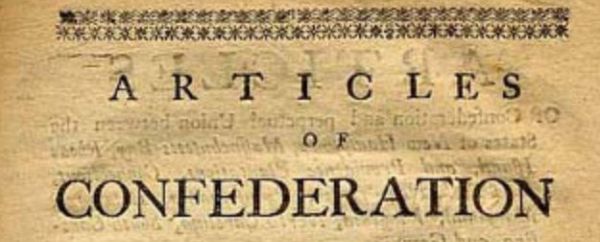The Original Article V – in the Articles of Confederation
By Stuart MacPhail – February 2021
Only a limited number of state legislators are familiar with the Fifth Article in the US Constitution and the powers that Article confers. Sadly, a far smaller percent of American citizens are familiar with that constitutional provision.
The Articles of Confederation (which preceded the US Constitution) also had a Fifth Article. It might be regarded as “the original Article V.” It dealt with the makeup of the national Congress, but unfortunately it did not provide a way to amend the Articles of Confederation. There was no practical way to do so
Article V, Articles of Confederation: “For the more convenient management of the general interests of the united states, delegates shall be annually appointed in such manner as the legislature of each state shall direct, to meet in Congress on the first Monday in November, in every year, with a power reserved to each state to recall its delegates, or any of them, at any time within the year, and to send others in their stead, for the remainder of the Year.” The Article went on to provide more details on the makeup of Congress.
The lack of a way to correct governing deficiencies led the drafters of the 1787 Constitution to make an amendment provision a high priority for inclusion in the new governing document.
The 1787 Article V says: “The Congress, whenever two thirds of both Houses shall deem it necessary, shall propose Amendments to this Constitution, or, on the Application of the Legislatures of two thirds of the several States, shall call a Convention for proposing Amendments, which, in either Case, shall be valid to all Intents and Purposes, as Part of this Constitution, when ratified by the Legislatures of three fourths of the several States, or by Conventions in three fourths thereof, as the one or the other Mode of Ratification may be proposed by the Congress; Provided that no Amendment which may be made prior to the Year One thousand eight hundred and eight shall in any Manner affect the first and fourth Clauses in the Ninth Section of the first Article; and that no State, without its Consent, shall be deprived of its equal Suffrage in the Senate.”
The above provision has led to 27 ratified amendments to the US Constitution, but all of those amendments originated in Congress. Not one originated in a “convention for proposing Amendments.”
According to James Madison’s notes: “Col. [George] Mason thought the plan of amending the Constitution exceptionable & dangerous. As the proposing of amendments is in both the modes to depend, in the first immediately, in the second, ultimately, on Congress, no amendments of the proper kind would ever be obtained by the people, if the Government should become oppressive, as he verily believed would be the case.”
Mason felt strongly about the unfortunate dependence on Congress for amendments. When, after several months of work, the day came for signing the proposed new Constitution (Saturday, September 15, 1787), Mason (and drafters Elbridge Gerry and Edmund Randolph) declined (until later) to sign the new document. Never the less, Article V does grant powers to amend America’s principle governing document.

